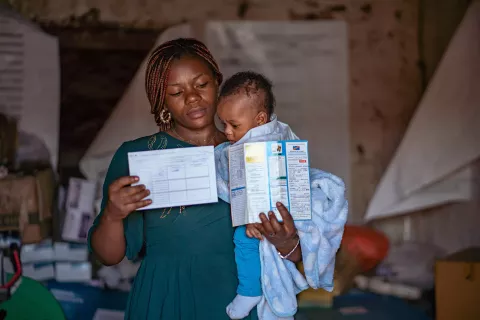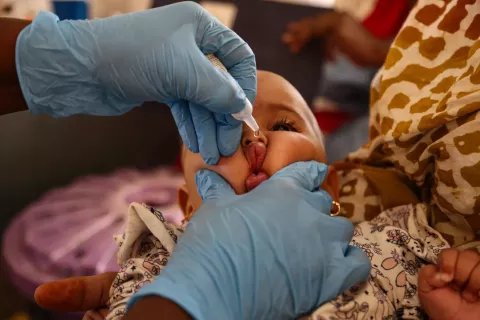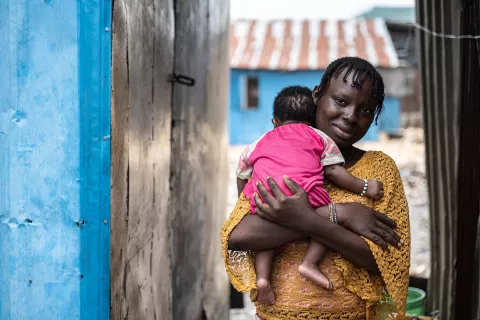Targeting the most vulnerable in Gabon as a pathway to equity
Generating income-generating activities: a springboard for empowerment

In villages throughout Gabon’s Ogooue Ivendo region, children bear the brunt of poverty and deprivation, lacking access to education, health and nutrition services and protection. Most also lack a birth certificate, resulting in their exclusion from many public services.
Mekambo, Gabon- 02 August 2018- Thecle, a disabled mother of six and head of household, is smiling. Leaning on a family member for support, Thecle reaches the front of the line and receives the first instalment of funds from an income-generating programme targeting vulnerable communities.
Thecle is from the village of Zoula, deep in Gabon’s equatorial forest, and is part of the original indigenous Baka community – sometimes referred to by the derogatory term “Pygmy.” She and other women gathered this day are about to gain greater autonomy, empowerment and improved care for their children.
Zoula is located in Gabon’s impoverished Ogooue Ivendo region, whose mostly indigenous inhabitants face multiple deprivations. Children in remote areas such as Zoula bear the brunt of poverty and deprivation, lacking access to education, health and nutrition services and protection. Most also lack a birth certificate, resulting in their exclusion from many public services.
Families cannot afford the 3,000 CFA (US$5) fee per child charged by the only nearby school –which has been closed for three years for want of pupils and teachers. Thecle’s 17-year-old daughter is still in sixth grade, and has no hope of taking the exams that would allow her to start secondary school, since she does not have a birth certificate.
The closest health post is an hour away, but cannot provide help since it lacks needed supplies and staff. Most trained health workers refuse to work in such remote areas. Equipment provided by the Government sits at the clinic, unpacked. So for Thecle and others, accessing health care requires a several-mile walk – often through the torrential rain that soaks the area for nine months of the year.

Generating income-generating activities: a springboard for empowerment
UNICEF is working with Gabon’s Ministry of Social Protection and National Fund for Social Action to improve the situation for the country’s most disadvantaged groups by seeking to expand social safety nets and protection schemes. The income-generating programme from which Thecle and others are benefitting aims to allow households in the most deprived areas to “access education, health coverage and social protection for their children”, notes UNICEF Representative Stephan Grieb.
Zoula is a pilot community in the effort to support income-generating activities. By increasing the income of the most deprived households, the pilot will enable them to claim their rights and benefit from other essential social services. This transformative effort should help Thecle, other beneficiaries – and their children – to rise out of poverty.
Advocating for disadvantaged groups
UNICEF expects that this pilot phase will pave the way for a gradual, comprehensive, inclusive and integrated approach that addresses the main bottlenecks hampering the realization of child rights, particularly for the indigenous population. Improving family incomes, making it possible for children to attend school and receive health care, will be complemented by legislative and policy advocacy to address other structural constraints. UNICEF will also support urgent action to help children obtain birth certificates, restoring their right to a legal identity and facilitating their access to available services.
UNICEF’s strategy is built around the concept of social inclusion.
UNICEF’s strong focus on equity, notes Stephan Grieb, "implies that every child has the minimum right to survive, develop and reach his or her full potential, without discrimination”.
UNICEF engages in evidence-based advocacy and policy support to ensure that government programmes reach those most in need.
To sustain those efforts and lay the foundation for more equitable and inclusive society in Gabon, additional resources are crucial, so that Thecle and indigenous and vulnerable communities can nurture the hope of lasting change for them and their children.




